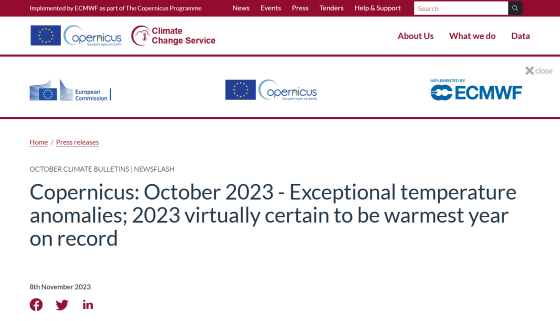Scientists say ``2023 will almost certainly be the hottest year on record,'' and 2024 could be even hotter.

It has been reported that 2023 will be the hottest month in recorded history, with July 2023 being recognized as the ``
Copernicus: October 2023 - Exceptional temperature anomalies; 2023 virtually certain to be warmest year on record | Copernicus
https://climate.copernicus.eu/copernicus-october-2023-exceptional-temperature-anomalies-2023-virtually-certain-be-warmest-year

2023 on track to be the hottest year on record, say scientists | Climate crisis | The Guardian
https://www.theguardian.com/environment/2023/nov/08/2023-on-track-to-be-the-hottest-year-on-record-say-scientists
In 2023, intense heat waves will cause large-scale wildfires to occur around the world, and many deaths due to the heat wave have been reported. Causes include human-induced global warming due to increased greenhouse gas emissions and deforestation, as well as the El Niño phenomenon , which is affecting climate around the world due to rising seawater temperatures in the tropical Pacific Ocean, and the Tonga earthquake that occurred in 2022. Water vapor released by large-scale volcanic eruptions has also been cited.
Summary of four weather conditions that are making 2023 particularly hot, what will happen after 2024? -GIGAZINE

The Copernicus Climate Change Service has newly announced that the global average surface temperature in October 2023 was 15.3℃, which was 0.85℃ higher than the average October temperature from 1991 to 2020, and 2019 was the warmest on record. It was reported that the temperature was 0.4℃ higher than the average temperature for October. The temperature anomaly in October 2023 was the second highest after September 2023 among all data sets.
Furthermore, the global average temperature from January to October 2023 was 1.43℃ higher than the average from 1850 to 1900, and 0.1℃ higher than the 10-month average of 2016, which was the hottest in history at the time of writing. Copernicus Climate Change Service reports.
The graph below plots temperature anomalies by month from January 1940 to October 2023. 2016, which was the hottest year in recorded history, is shown as a lighter, thicker red line, and 2023 is shown as a darker, thicker red line. is showing. Although January to April was hotter than usual in 2016, May was almost the same, and June to October was higher than 2016 for five consecutive months.

Samantha Burgess, Deputy Director of the Copernicus Climate Change Service, said: “October 2023 saw exceptional temperature extremes following four months of breaking global temperature records. 'This is 1.43 degrees Celsius above the pre-industrial average temperature,' he said, emphasizing the urgency of ambitious climate change measures ahead of the 28th Conference of the Parties to the United Nations Framework Convention on Climate Change (COP28), which begins on November 30, 2023. expressed the view that it is increasing.
Friederike Otto, a climate scientist at
The El Niño phenomenon occurring at the time of article creation is expected to continue until the spring of 2024 . Generally, the effects of an El Niño phenomenon appear in the year following its occurrence, so it is likely that temperatures will be even higher in 2024.

Related Posts:
in Science, Posted by log1h_ik







